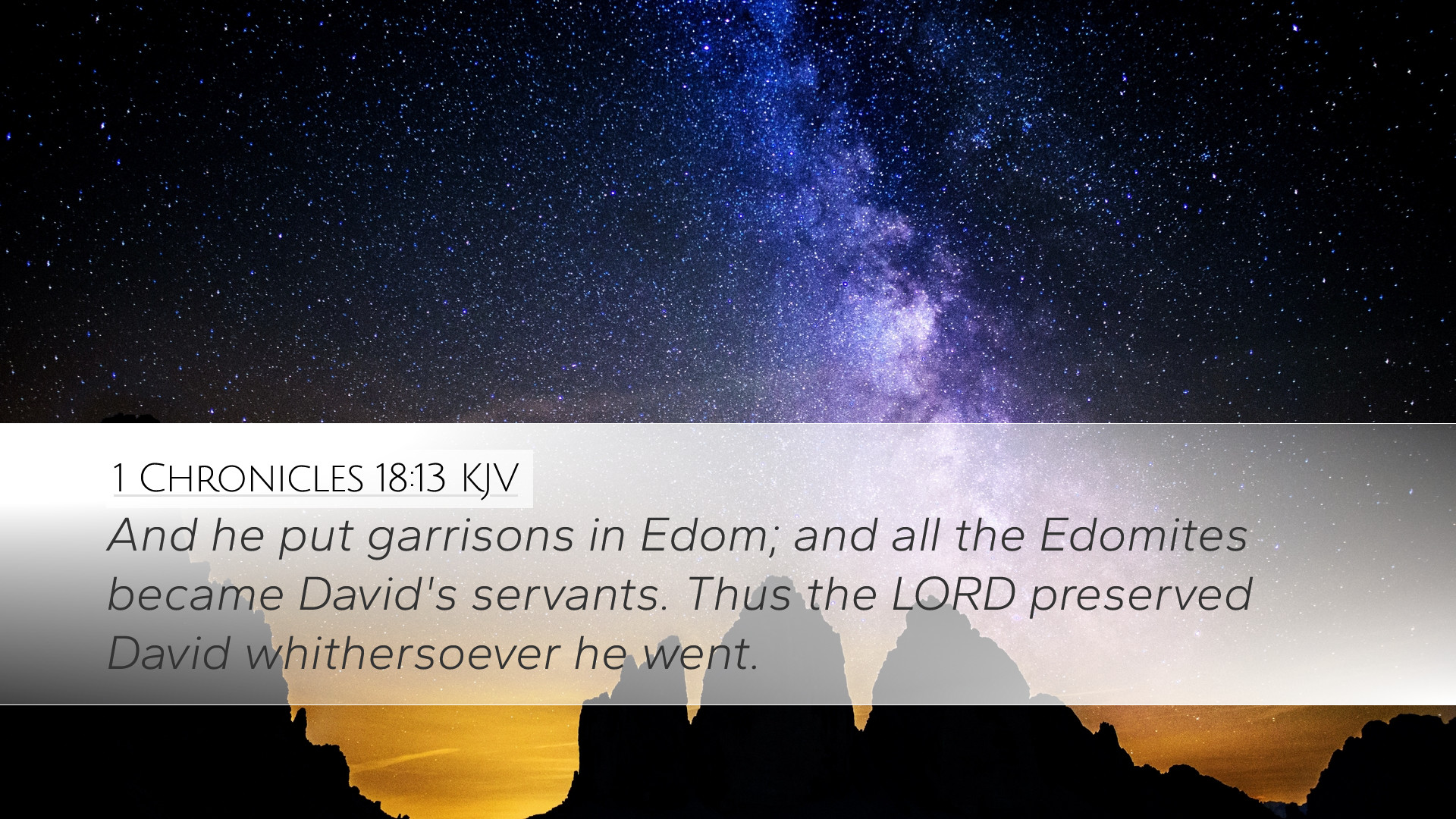Commentary on 1 Chronicles 18:13
Verse Text: "And he put garrisons in Edom; and all the Edomites became David's servants. Thus the LORD preserved David whithersoever he went."
Introduction
The verse 1 Chronicles 18:13 is a pivotal moment in David's reign as king of Israel. It highlights the successes of his military campaigns and the establishment of control over Edom. The context of this verse reflects themes of authority, divine support, and the consequences of warfare in the biblical narrative.
Historical Context
This passage recapitulates the significant victories of David over Edom, which are also noted in 2 Samuel 8:14. Understanding the historical backdrop of Israel's relations with Edom is crucial. Edom, descendants of Esau, often stood in opposition to Israel. David's military endeavors secured Israel's borders and imposed hegemony over its neighbors.
David's Military Strategy
David implemented a strategic military approach, including the establishment of garrisons. The deployment of garrisons in Edom served not merely as a measure of control but also as a deterrent against rebellion.
Theological Significance
Throughout this passage, the perception of divine providence is significant. David's military successes are attributed to the LORD's preservation and guidance. The phrase "Thus the LORD preserved David whithersoever he went" echoes a recurring theme in Scripture—God's protection over His chosen leaders.
The Role of Providence in Leadership
For pastors and theologians, this verse serves as a reminder of the importance of seeking God’s guidance in leadership. Just as David relied on the Lord, present-day leaders and believers must acknowledge that their strength and success are contingent upon divine favor.
Interpretative Insights from Commentators
-
Matthew Henry
Matthew Henry elaborates on the idea that David's actions in Edom signify more than conquest; they represent the establishment of a divine order. Henry asserts that David’s victories were instrumental in consolidating power not just politically, but also spiritually, as they fulfilled God’s promises to establish Israel as a great nation.
-
Albert Barnes
Albert Barnes emphasizes the military success depicted in this verse reflecting on David’s wise leadership. Barnes points out that the imposition of garrisons was not only a military strategy but a means of ensuring stability and peace within the region. He notes that this also marked the submission of Edom, highlighting the geopolitical implications of David's reign.
-
Adam Clarke
Adam Clarke offers insight into the spiritual lessons derived from David's success. He connects David's military conquests to the Lord’s unwavering support and encourages believers to recognize that victories in their lives, whether personal or communal, are artifacts of divine stewardship and fidelity.
Reflections for Current Application
As modern readers reflect on this verse, several applications can be drawn:
- Leadership: Embrace the principle of vigilant leadership rooted in faith. Leaders are to rely on God's guidance for their strategies and decisions.
- Divine Assurance: Acknowledge the ongoing presence of divine support in the face of challenges. Just as David was preserved, believers today should trust in God's protection.
- Conflict and Resolution: Understand that military victories and territorial acquiescence are often a necessity in biblical history, presenting the complexity of God's will in human affairs.
Conclusion
1 Chronicles 18:13 serves as a microcosm of David's reign—an epitome of divine favor leading to military and political consolidation. Interpreting this verse through the lens of historical context, theological significance, and reflections from esteemed commentators enriches our understanding of the text. For pastors, students, and scholars, this passage resonates as a call to rely on divine support, embody strong leadership, and uphold integrity amidst every endeavor. Ultimately, the narrative encourages ongoing reflection on the divine relationship between God and His chosen leaders.


